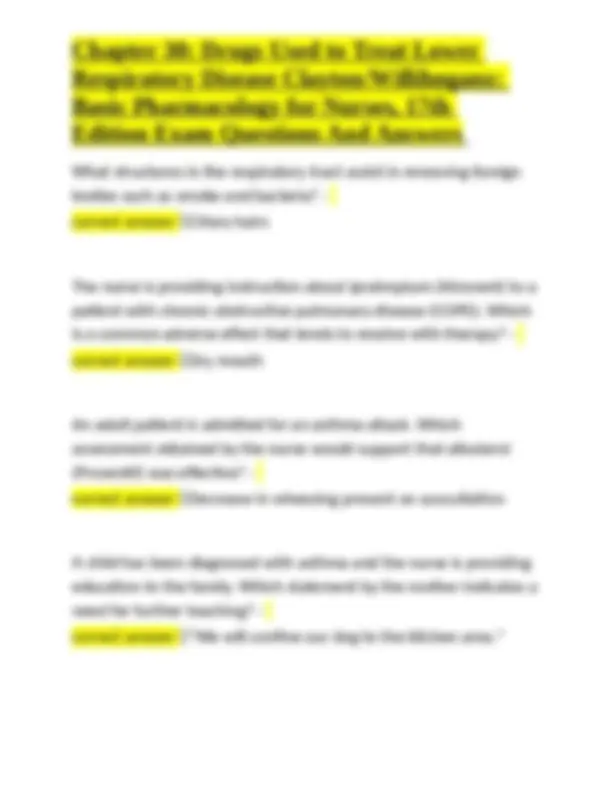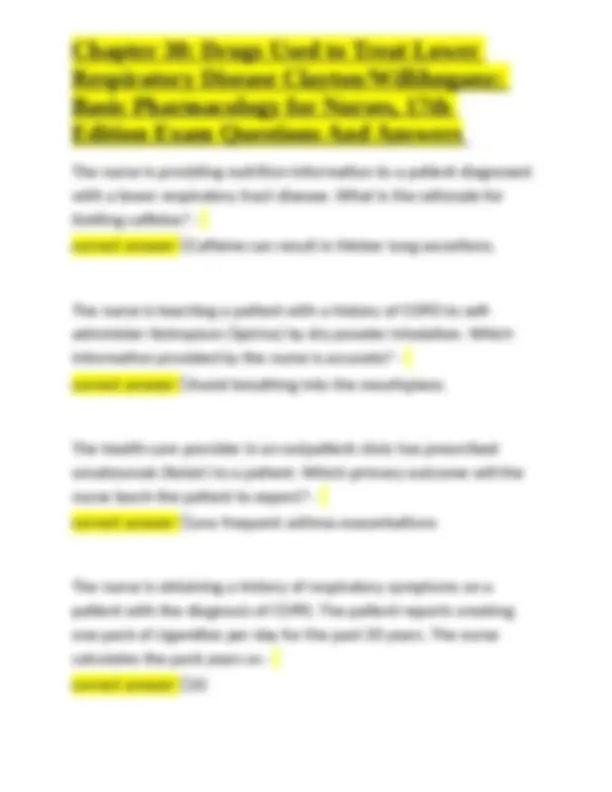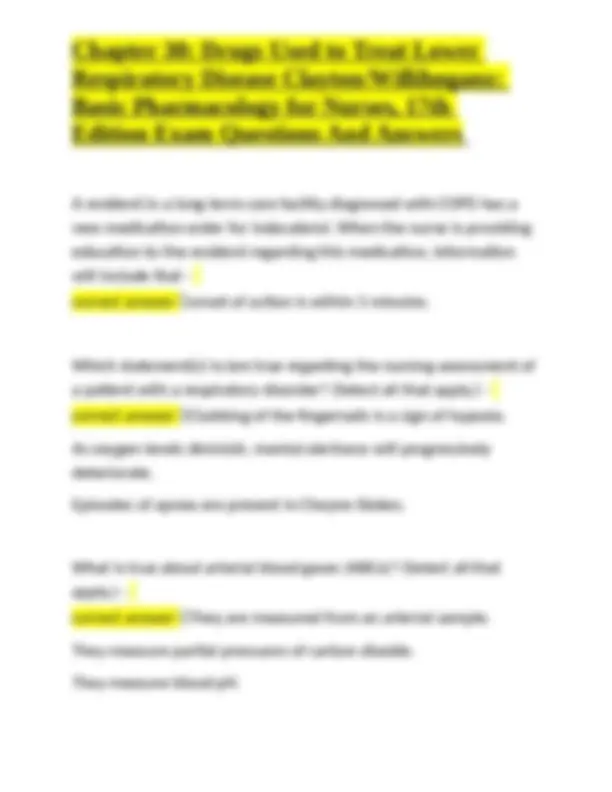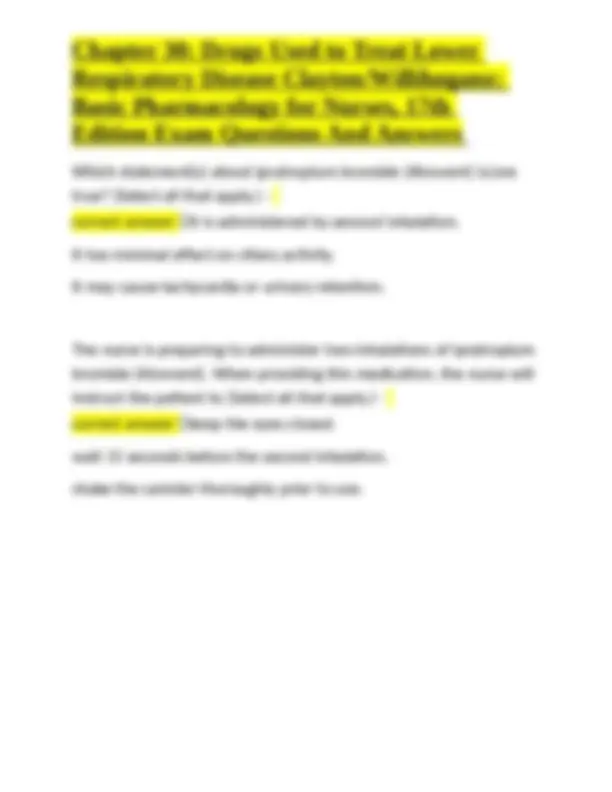






Study with the several resources on Docsity

Earn points by helping other students or get them with a premium plan


Prepare for your exams
Study with the several resources on Docsity

Earn points to download
Earn points by helping other students or get them with a premium plan
Community
Ask the community for help and clear up your study doubts
Discover the best universities in your country according to Docsity users
Free resources
Download our free guides on studying techniques, anxiety management strategies, and thesis advice from Docsity tutors
Chapter 30: Drugs Used to Treat Lower Respiratory Disease Clayton/Willihnganz: Basic Pharmacology for Nurses, 17th Edition Exam Questions And Answers
Typology: Exams
1 / 8

This page cannot be seen from the preview
Don't miss anything!





A patient has questions regarding a recently prescribed antitussive agent. Which response by the nurse is the best? - correct answer ✅"It will reduce the frequency of your cough." Which is a common expectorant in over-the-counter medications? - correct answer ✅Guaifenesin What is the reason for administering sodium chloride to a patient with emphysema? - correct answer ✅To decrease mucus viscosity Within minutes of the initiation of a nebulizer treatment with a sympathomimetic bronchodilator, the patient turns on his call light and states that he feels "panicky" and his heart is racing. Which action will the nurse take? - correct answer ✅Stop treatment and notify the health care provider. Premedication assessments before the use of anticholinergic bronchodilating agents should verify that the patient has no history
of which condition? - correct answer ✅Glaucoma A patient is seen in the emergency department. The patient had been maintained on theophylline (Theo Dur), and a blood sample reveals the serum theophylline level is subtherapeutic. Which may cause a subtherapeutic serum level? - correct answer ✅Smoking What is the action of zafirlukast (Accolate), a leukotriene receptor antagonist? - correct answer ✅Decreases leukotriene release What is albuterol (Proventil) used to treat? - correct answer ✅Acute bronchospasm From where do the fluids of the respiratory tract originate? - correct answer ✅Specialized mucous glands called goblet cells
The nurse is providing nutrition information to a patient diagnosed with a lower respiratory tract disease. What is the rationale for limiting caffeine? - correct answer ✅Caffeine can result in thicker lung secretions. The nurse is teaching a patient with a history of COPD to self- administer tiotropium (Spiriva) by dry powder inhalation. Which information provided by the nurse is accurate? - correct answer ✅Avoid breathing into the mouthpiece. The health care provider in an outpatient clinic has prescribed omalizumab (Xolair) to a patient. Which primary outcome will the nurse teach the patient to expect? - correct answer ✅Less frequent asthma exacerbations The nurse is obtaining a history of respiratory symptoms on a patient with the diagnosis of COPD. The patient reports smoking one pack of cigarettes per day for the past 20 years. The nurse calculates the pack years as - correct answer ✅ 20
A resident in a long-term care facility diagnosed with COPD has a new medication order for indacaterol. When the nurse is providing education to the resident regarding this medication, information will include that - correct answer ✅onset of action is within 5 minutes. Which statement(s) is/are true regarding the nursing assessment of a patient with a respiratory disorder? (Select all that apply.) - correct answer ✅Clubbing of the fingernails is a sign of hypoxia. As oxygen levels diminish, mental alertness will progressively deteriorate. Episodes of apnea are present in Cheyne-Stokes. What is true about arterial blood gases (ABGs)? (Select all that apply.) - correct answer ✅They are measured from an arterial sample. They measure partial pressures of carbon dioxide. They measure blood pH.
Pulse oximetry reading Which principle(s) would be when teaching a patient to use a steroid inhaler? (Select all that apply.) - correct answer ✅Frequent oral hygiene is necessary. Rinse and spit after inhalation of the medication. When taking a steroid drug as well as a bronchodilator, the bronchodilator should be administered first. Hold the breath for 10 seconds during inhalation of the medication. Which statement(s) about acetylcysteine is/are true? (Select all that apply.) - correct answer ✅It reduces viscosity of secretions. It treats acetaminophen toxicity. It is given to improve airway flow. It is administered by inhalation.
Which statement(s) about ipratropium bromide (Atrovent) is/are true? (Select all that apply.) - correct answer ✅It is administered by aerosol inhalation. It has minimal effect on ciliary activity. It may cause tachycardia or urinary retention. The nurse is preparing to administer two inhalations of ipratropium bromide (Atrovent). When providing this medication, the nurse will instruct the patient to (Select all that apply.) - correct answer ✅keep the eyes closed. wait 15 seconds before the second inhalation. shake the canister thoroughly prior to use.